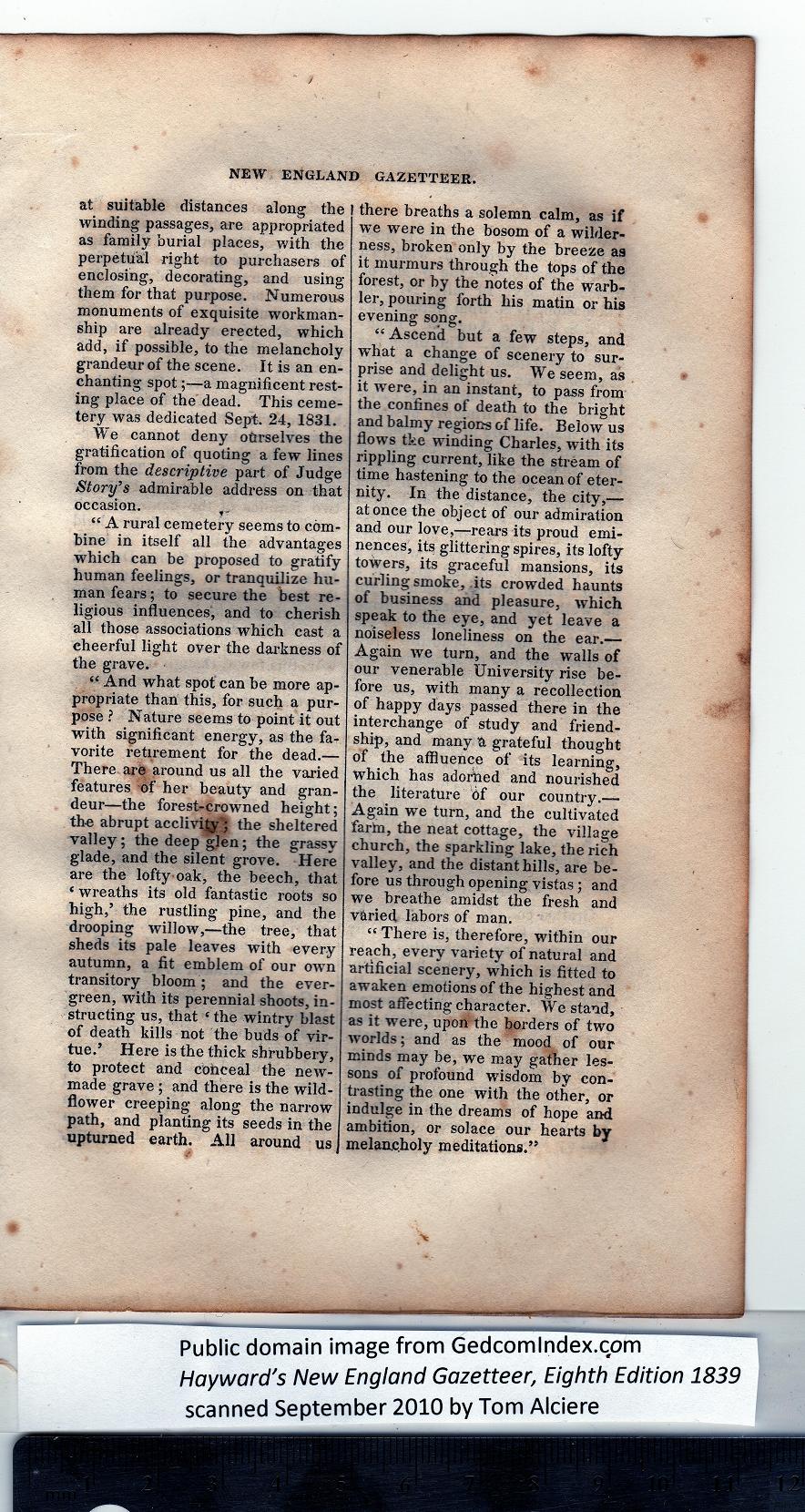|
at suitable distances along the
winding passages, are appropriated
as family burial places, with the
perpetual right to purchasers of
enclosing, decorating, and using
them for that purpose. Numerous
monuments of exquisite workman-
ship are already erected, which
add, if possible, to the melancholy
grandeur of the scene. It is an en-
chanting spot;—a magnificent rest-
ing place of the dead. This ceme-
tery was dedicated Sept. 24, 1831.
We cannot deny ourselves the
gratification of quoting a few lines
from the descriptive part of Judge
Story’s admirable address on that
occasion. t.
“ A rural cemetery seems to com-
hine in itself all the advantages
which can be proposed to gratify
human feelings, or tranquilize hu-
man fears; to secure the best re-
ligious influences, and to cherish
all those associations which cast a
cheerful light over the darkness of
the grave.
“ And what spot can he more ap-
propriate than this, for such a pur-
pose ? Nature seems to point it out
with significant energy, as the fa-
vorite retirement for the dead.—
There are around us all the varied
features of her beauty and gran-
deur—the forest-crowned height;
the abrupt acclivi|y3 the sheltered
valley; the deep glen; the grassy
glade, and the silent grove. Here
are the lofty oak, the beech, that
c wreaths its old fantastic roots so
high,’ the rustling pine, and the
drooping willow,—the tree, that
sheds its pale leaves with every
autumn, a fit emblem of our own
transitory bloom ; and the ever-
green, with its perennial shoots, in-
structing us, that ‘ the wintry blast
of death kills not the buds of vir-
tue.’ Here is the thick shrubbery,
to protect and conceal the new-
made grave ; and there is the wild-
flower creeping along the narrow
path, and planting its seeds in the
upturned earth. All around us |
there breaths a solemn calm, as if
wTe were in the bosom of a wilder-
ness, broken only by the breeze as
it murmurs through the tops of the
forest, or hy the notes of the warb-
ler, pouring forth his matin or his
evening song.
“ Ascend but a few steps, and
what a change of scenery to sur-
prise and delight us. We seem, as
it were, in an instant, to pass from
the confines of death to the bright
and balmy regions of life. Below us
flows tke winding Charles, with its
rippling current, like the stream of
time hastening to the ocean of eter-
nity. In the distance, the city,—
at once the object of our admiration I
and our love,—rears its proud emi- ’
nences, its glittering spires, its lofty
towers, its graceful mansions, its
curling smoke, its crowded haunts
of business and pleasure, which
speak to the eye, and yet leave a
noiseless loneliness on the ear.— I
Again we turn, and the walls of
our venerable University rise be-
fore us, with many a recollection
of happy days passed there in the \
interchange of study and friend- i
ship, and many a grateful thought
of the affluence of its learning,
which has adorhed and nourished
the literature 6f our country.—
Again we turn, and the cultivated
farm, the neat cottage, the village
church, the sparkling lake, the rich
valley, and the distant hills, are be-
fore us through opening vistas; and
we breathe amidst the fresh and
v&ried labors of man.
“ There is, therefore, within our
reach, every variety of natural and
artificial scenery, which is fitted to
awaken emotions of the highest and
most affecting character. We stand,
as it were, upon the borders of two
worlds; and as the mood of our
minds may be, we may gather les-
sons of profound wisdom by con-
trasting the one with the other, or
indulge in the dreams of hope and
ambition, or solace our hearts by
melancholy meditations.” |
